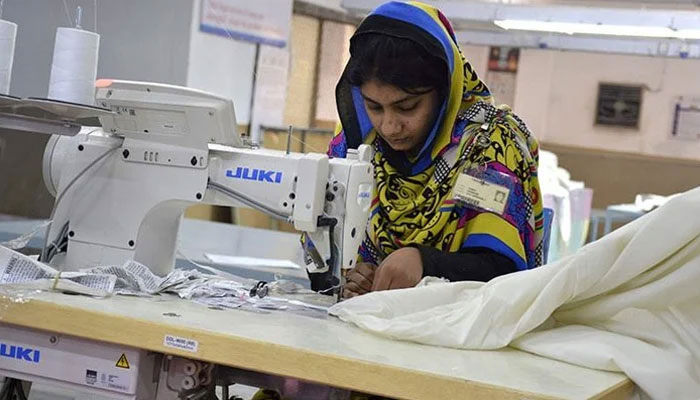A balanced life
In Pakistan, too, there has been growing trend of home-based businesses
The corporate world is fast evolving. From flexible hours to a hybrid work model, most companies are revising their policies to increase productivity by ensuring employees are not stressed. The adoption of such policies is slow in Pakistan, which is why leading institutions have recommended introducing family-friendly workplace policies here. A joint report by the Pakistan Business Council (PBC), Unicef and UN Women, titled ‘Mapping Family-Friendly Workplace Policies in Pakistan’, highlights the crucial role of such policies in strengthening the social sector, businesses, employees and Pakistan’s economic growth. The report says that steps like parental leave, flexible work and childcare support improve employee well-being, child development, gender equality and economic sustainability. Per the report, Pakistan has over 92 million children under 14. With limited formal childcare, many parents have to either leave their careers or refuse more responsibilities as they are the primary caregivers of their children. In most cases, women have to make this sacrifice.
This, however, is not limited to Pakistan. According to a Global Gender Gap report, many women have turned to small, home-based businesses to earn income and also be present for their children and their homes. In Pakistan, too, there has been a growing trend of home-based businesses. But such informal setups also come with their own set of challenges, making the entire exercise less fruitful. Most experts strongly believe these policies are essential for a modern, resilient workforce, leading to better talent retention, lower absenteeism and greater gender diversity. Our workforce has a lot of potential, but the fact that half of our population is stuck in domestic responsibilities is hurting Pakistan’s ability to reach high economic growth targets. And while the lack of formal childcare hurts parents, it also clips the wings of older siblings who have to look after the younger ones when their parents are not home.
In that context, it is good that we have a starting point. The latest report on workplace policies examines the impact of family-friendly policies, particularly childcare, on economic growth, gender equality and workforce retention. It urges businesses to understand employee needs and explore sustainable childcare models, recommending flexible work arrangements and employer-supported childcare. In our country, several young mothers and married women have faced a ‘motherhood penalty’ where they are denied better opportunities because they are perceived as not being interested in their career. It is time to remove this bias and create a Pakistan that respects all talents and allows those needing assistance to advance in their careers. Our bright minds sit at home, slowly losing their potential, because our workplaces are completely ignorant of parents’ needs. Such policies should not be limited to maternal or paternal leaves. We have to draft polices where parents can be actively involved in their children’s lives – from regular PTMs to annual programmes, there has to be some leniency for employees.
-
 Extreme Cold Warning Issued As Blizzard Hits Southern Ontario Including Toronto
Extreme Cold Warning Issued As Blizzard Hits Southern Ontario Including Toronto -
 Lana Del Rey Announces New Single Co-written With Husband Jeremy Dufrene
Lana Del Rey Announces New Single Co-written With Husband Jeremy Dufrene -
 Ukraine-Russia Talks Heat Up As Zelenskyy Warns Of US Pressure Before Elections
Ukraine-Russia Talks Heat Up As Zelenskyy Warns Of US Pressure Before Elections -
 Lil Nas X Spotted Buying Used Refrigerator After Backlash Over Nude Public Meltdown
Lil Nas X Spotted Buying Used Refrigerator After Backlash Over Nude Public Meltdown -
 Caleb McLaughlin Shares His Resume For This Major Role
Caleb McLaughlin Shares His Resume For This Major Role -
 King Charles Carries With ‘dignity’ As Andrew Lets Down
King Charles Carries With ‘dignity’ As Andrew Lets Down -
 Brooklyn Beckham Covers Up More Tattoos Linked To His Family Amid Rift
Brooklyn Beckham Covers Up More Tattoos Linked To His Family Amid Rift -
 Shamed Andrew Agreed To ‘go Quietly’ If King Protects Daughters
Shamed Andrew Agreed To ‘go Quietly’ If King Protects Daughters -
 Candace Cameron Bure Says She’s Supporting Lori Loughlin After Separation From Mossimo Giannulli
Candace Cameron Bure Says She’s Supporting Lori Loughlin After Separation From Mossimo Giannulli -
 Princess Beatrice, Eugenie Are ‘not Innocent’ In Epstein Drama
Princess Beatrice, Eugenie Are ‘not Innocent’ In Epstein Drama -
 Reese Witherspoon Goes 'boss' Mode On 'Legally Blonde' Prequel
Reese Witherspoon Goes 'boss' Mode On 'Legally Blonde' Prequel -
 Chris Hemsworth And Elsa Pataky Open Up About Raising Their Three Children In Australia
Chris Hemsworth And Elsa Pataky Open Up About Raising Their Three Children In Australia -
 Record Set Straight On King Charles’ Reason For Financially Supporting Andrew And Not Harry
Record Set Straight On King Charles’ Reason For Financially Supporting Andrew And Not Harry -
 Michael Douglas Breaks Silence On Jack Nicholson's Constant Teasing
Michael Douglas Breaks Silence On Jack Nicholson's Constant Teasing -
 How Prince Edward Was ‘bullied’ By Brother Andrew Mountbatten Windsor
How Prince Edward Was ‘bullied’ By Brother Andrew Mountbatten Windsor -
 'Kryptonite' Singer Brad Arnold Loses Battle With Cancer
'Kryptonite' Singer Brad Arnold Loses Battle With Cancer




